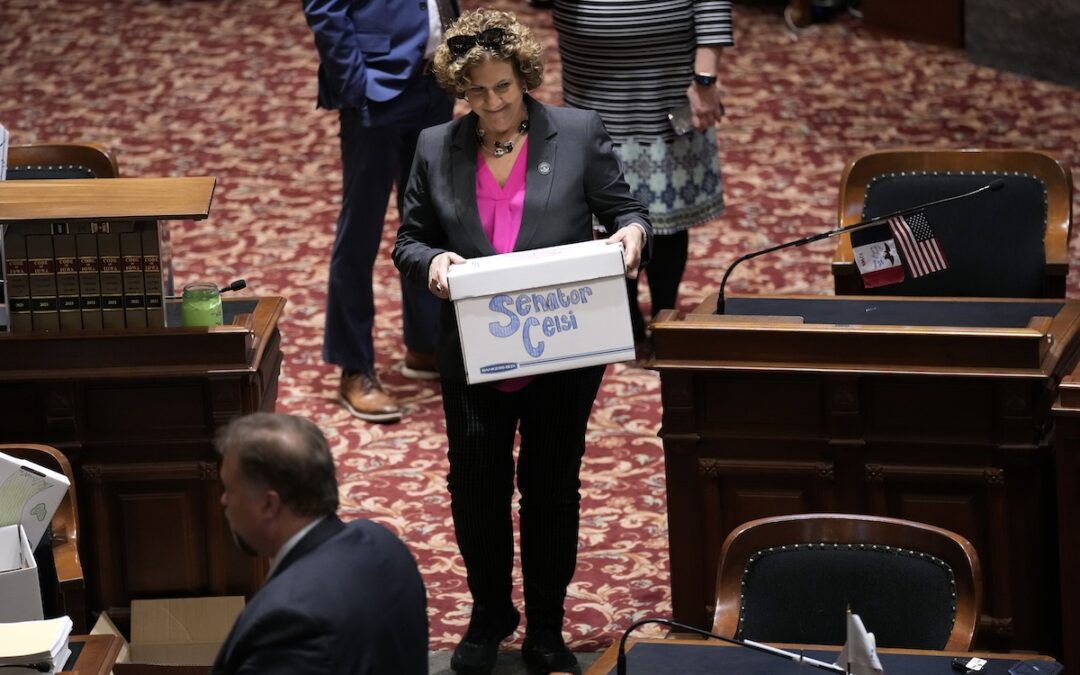
Iowans rally in opposition to SF 2340, a new immigration law that would undercut federal immigration law, on May 9, 2024. (Avery Staker/ Iowa Starting Line)
Immigration advocates filed a federal lawsuit Thursday to stop Iowa’s new immigration law—SF 2340—from taking effect arguing that the legislation creates new crimes for anyone in Iowa who has been deported in the past even if they are here legally now.
A hearing date has not been set yet.
The lawsuit was filed in the US District Court for the Southern District of Iowa by the American Immigration Council, the American Civil Liberties Union (ACLU) of Iowa, and the national ACLU on behalf of the Iowa Migrant Movement for Justice and the thousands of immigrants that the organization assists, including two individual Iowans.
“The crux of this lawsuit is that it challenges the state’s ability to create its own immigration system, flouting more than a century of law that leaves that work to the federal government,” said Kate Melloy Goettlle, senior legal director of the American Immigration Council, during a Thursday press conference.
“That is well-settled law, but it also makes practical sense: We don’t want 50 state governments coming up with 50 different immigration systems.”
The two plaintiffs in the suit are identified as Jane Doe and Elizabeth Doe. Jane Doe is a 68-year-old Garnavillo resident who has been in the US legally since 2022 but was previously deported to Mexico.
“She was deported to Mexico in 2005 and waited 17 years to be able to come back to the United States lawfully where her family resides,” Melloy Goettlle said. “She has five kids and many grandchildren, most of whom live here in Iowa, and she is under great stress and anxiety not knowing if she’s going to be prosecuted under this law.”
“This is impacting Iowans who are here with green cards living here lawfully and who have returned to the United States with federal authorization.”
Elizabeth Doe is a 40-year-old legal resident from Des Moines who moved to the US from Colombia in 2016, was deported in 2017, and returned in 2018 after marrying her husband who is a US citizen.
SF 2340 makes illegal immigration a state crime in addition to being a federal crime and turns Iowa law enforcement agencies into quasi-immigration offices. The law charges undocumented migrants found in Iowa with an aggravated misdemeanor if they have been previously denied entry into the United States, or excluded, deported, or removed from the country.
The charge becomes a felony if the undocumented migrant’s prior removal includes a conviction for drugs and/or crimes against a person. SF 2340 also allows Iowa judges to order the deportation of undocumented migrants and gives law enforcement agencies the authority to transfer undocumented migrants to the nearest US port of entry.
The US Department of Justice warned Iowa that this law violates the US Constitution and announced its own lawsuit against Iowa also on Thursday. Melloy Goettlle agrees.
“It’s a law that makes absolutely no sense and is clearly unconstitutional,” she said.
The lawsuit names Gov. Kim Reynolds, Attorney General Brenna Bird, Clayton County Attorney Zach Herrmann, and Polk County Attorney Kimberly Graham as defendants.
Graham said her office will comply with any future court rulings, but it will not “participate in this lawsuit or spend the money of the people of Polk County defending this action.” Reynolds and Bird each put out statements defending the legislation.
“As governor, I have a responsibility to protect the citizens of Iowa,” Reynolds said. “Since President Biden refuses to enforce our nation’s immigration laws—threatening the safety of our citizens–Iowa will step in.”
Bird’s remarks also played up public safety as the reason for this legislation, something Iowa’s law enforcement agencies have pushed back on and that Iowa ACLU Director Rita Bettis Austen also noted.
“This is harmful to public safety, it is not helpful to public safety,” she said. “This law makes it impossible for immigrants to feel safe, contact police, and community policing relies on trusting relationships between law enforcement and the community.”
Dr. Maria Corona, executive director of the Iowa Coalition Against Domestic Violence, also highlighted how this legislation could further harm victims of domestic or sexual abuse.
“This law not only deters immigrant victims of intimate partner violence from calling the police, but it penalizes victims who are already working with law enforcement to improve public safety by putting them at risk for arrest, deportation, or incarceration,” she said.
“Discouraging domestic violence victims from calling police when they are in danger puts individuals at greater risk, undermines public safety, and threatens the well-being of communities across Iowa.”
Story updated to reflect the additional lawsuit by the US Department of Justice.

Sen. Claire Celsi remembered for her passion and outspokenness
The Democratic state senator from West Des Moines died on Oct. 6 after a bout with an undisclosed illness. West Des Moines resident Al Womble will...

Hundreds gather for ‘protective accompaniment’ event outside Cedar Rapids ICE office
Organizers with Escucha Mi Voz Iowa hosted a rally Wednesday near Cedar Rapids' ICE field office to show support to those entering for routine...

AG Bird drops suit to defund Winneshiek Sheriff
The Iowa Attorney General is dropping her lawsuit against the Winneshiek County Sheriff over a social media post. Bird says the county is in “full...

Pascual Pedro-Pedro not the only one: Immigration arrests, deportations triple in Iowa
Immigration arrests and deportations in Iowa have tripled. You think Iowa is hollowing out now? It's about to get worse. Pascual Pedro-Pedro, the...

Trump administration hands over Medicaid recipients’ personal data, including addresses, to ICE
WASHINGTON (AP) — Immigration and Customs Enforcement officials will be given access to the personal data of the nation’s 79 million Medicaid...

ICE in Iowa: West Liberty man with no criminal record detained
It's happening in Iowa. Pascual Leonardo Pedro-Pedro, 20, of West Liberty, went to a routine annual immigration check-in on July 1—abiding by what...





